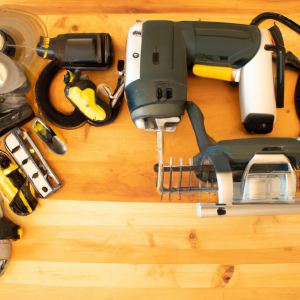Are you a homeowner looking to make a positive impact on the environment? Sustainable living is not only good for the planet, but it can also save you money in the long run.
In this article, you will discover practical ways to reduce energy consumption, implement sustainable practices in your yard, choose eco-friendly materials for home improvement projects, create a recycling and waste management system, and conserve water.
By incorporating these strategies into your lifestyle, you can contribute to a more sustainable future while enjoying the benefits of a greener home.

Key Takeaways
- Use LED light bulbs to reduce energy consumption and increase the lifespan of bulbs
- Incorporate composting into yard maintenance to create nutrient-rich soil and reduce the need for chemical fertilizers
- Practice rainwater harvesting to save water and promote biodiversity in the yard
- Choose eco-friendly materials for home improvement projects to conserve resources and contribute to a greener future
Reducing Energy Consumption in Your Home
You can reduce energy consumption in your home by using LED light bulbs instead of traditional incandescent bulbs. LED bulbs are more energy-efficient and can last up to 25 times longer than incandescent bulbs. This means you’ll not only save money on your electricity bill, but also reduce the number of bulbs you need to buy and dispose of.
Additionally, LED bulbs produce less heat, making them safer to use and reducing the load on your cooling system. Another way to reduce energy consumption is by properly insulating your home. Good insulation can prevent heat loss in the winter and keep your home cooler in the summer, reducing the need for heating and air conditioning.
By implementing these changes, you can make your home more energy-efficient and contribute to a sustainable future.
Implementing Sustainable Practices in Your Yard
Start by incorporating composting and rainwater harvesting into your yard maintenance routine.
Composting is a sustainable practice that benefits both your yard and the environment. By composting your organic waste, such as food scraps and yard trimmings, you can create nutrient-rich soil that promotes healthy plant growth. This reduces the need for chemical fertilizers and promotes biodiversity in your yard.
Additionally, rainwater harvesting allows you to collect and store rainwater for later use in your yard. This not only saves water but also reduces the strain on municipal water supplies.
By implementing these sustainable practices, you can create a more eco-friendly yard that contributes to a healthier planet.
So why not start today and make your yard a haven for both you and nature?
Choosing Eco-Friendly Materials for Home Improvement Projects
When embarking on home improvement projects, it’s important to choose eco-friendly materials to minimize environmental impact. By opting for sustainable materials, you can contribute to a greener future. Here are some eco-friendly options to consider:
- Recycled materials: By using materials that have been repurposed from previous projects, you can reduce waste and conserve resources.
- Renewable materials: Opt for materials that come from renewable sources, such as bamboo or cork. These materials can be harvested without depleting the ecosystem.
- Low VOC products: Choose paints, adhesives, and sealants with low volatile organic compound (VOC) content. These products release fewer harmful chemicals into the environment.
- Energy-efficient appliances: When upgrading your home, consider appliances with high energy efficiency ratings. These can help you save on energy costs and reduce your carbon footprint.
By making conscious choices, you can create a sustainable and eco-friendly home environment.
Creating a Recycling and Waste Management System
Consider implementing a recycling and waste management system in your home to promote a greener future.
By creating a system that effectively manages your household waste, you can significantly reduce your environmental footprint.
Start by setting up designated recycling bins for different materials such as paper, plastic, glass, and metal. Educate yourself and your family about what items can be recycled and how to properly sort them.
Additionally, consider composting organic waste to divert it from the landfill and create nutrient-rich soil for your gardens.
To further minimize waste, try to reduce your consumption of single-use items and opt for reusable alternatives instead.
By taking these steps, you can contribute to a more sustainable lifestyle and create a sense of belonging to a community that values the environment.
Conserving Water in Your Home
Implementing water conservation practices in your home, such as fixing leaks and installing low-flow fixtures, can help reduce your environmental impact. Here are four easy ways to conserve water and make a positive difference:
- Upgrade to low-flow fixtures: Replace old faucets, showerheads, and toilets with water-efficient models. These fixtures are designed to use less water without compromising performance.
- Collect rainwater for outdoor use: Install a rain barrel or cistern to capture rainwater from your roof. Use this water to irrigate your garden or wash your car, reducing your reliance on treated water.
- Time your showers: Taking shorter showers can significantly decrease your water usage. Consider using a shower timer or playing your favorite song to keep track of time and limit your water consumption.
- Fix leaks promptly: Even small leaks can waste a significant amount of water over time. Regularly check for leaks in faucets, toilets, and pipes, and repair them immediately to prevent water loss.
By incorporating these water conservation practices into your daily routine, you can contribute to a more sustainable future while reducing your water bills.
Frequently Asked Questions
How can I reduce energy consumption in my home without making major renovations or investments?
To reduce energy consumption in your home without major renovations or investments, you can start by using energy-efficient light bulbs, unplugging electronics when not in use, sealing air leaks, and adjusting your thermostat wisely.
Are there any eco-friendly materials available for landscaping and yard maintenance?
Yes, there are eco-friendly materials for landscaping and yard maintenance. Consider using natural mulch made from recycled materials, native plants, and organic fertilizers. These options can help reduce environmental impact and create a sustainable outdoor space.
What are some easy ways to incorporate sustainable practices in my yard without sacrificing aesthetics?
To incorporate sustainable practices in your yard without sacrificing aesthetics, you can start by using native plants, which require less water and maintenance. Additionally, consider installing a rainwater harvesting system and using natural pest control methods.
How can I ensure that the materials I choose for my home improvement projects are truly eco-friendly?
To ensure eco-friendly materials for home improvement projects, look for certifications like LEED or Energy Star. Check product labels for recycled content, low-VOC emissions, and renewable resources. Research companies’ sustainability practices and reviews from other homeowners.
What are some creative ways to repurpose or recycle household waste that may not be accepted in regular recycling programs?
Get creative with repurposing or recycling household waste that may not be accepted in regular programs. Turn old plastic bottles into planters, use glass jars for storage, or make art from scrap materials. Make a difference and belong to a sustainable community.
Conclusion
In conclusion, sustainable living for homeowners is not only beneficial for the environment but also for your own well-being.
By reducing energy consumption, implementing sustainable practices in your yard, choosing eco-friendly materials, creating a recycling system, and conserving water, you can make a significant impact.
These actions not only help to reduce your carbon footprint but also save you money in the long run.
By making small changes in your daily habits, you can contribute to a more sustainable future for all.


